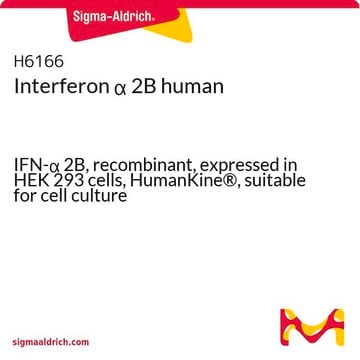SRP3169
TFF3 human
recombinant, expressed in E. coli, ≥98% (SDS-PAGE), ≥98% (HPLC), suitable for cell culture
Synonyme(s) :
ITF, TFI, Intestinal trefoil factor, Trefoil Factor 3
About This Item
Produits recommandés
Source biologique
human
Produit recombinant
expressed in E. coli
Pureté
≥98% (HPLC)
≥98% (SDS-PAGE)
Forme
lyophilized
Puissance
1.0-10.0 mg per mL
Poids mol.
13.2 kDa
Conditionnement
pkg of 20 μg
Technique(s)
cell culture | mammalian: suitable
Impuretés
<0.1 EU/μg endotoxin, tested
Couleur
white
Numéro d'accès UniProt
Conditions d'expédition
wet ice
Température de stockage
−20°C
Informations sur le gène
human ... TFF3(7033)
Description générale
The trefoil factor peptides (TFF1, TFF2, and TFF3) are secreted in the gastrointestinal tract. They are secreted peptides which are protease-resistant. TFF-3 is expressed by goblet cells and in the uterus, and has also been shown to be expressed in certain cancers, including colorectal, hepatocellular, and in biliary tumors. Recombinant human TFF3 is a homodimeric protein consisting of two 59 amino acid chains, which includes a 40-amino acid trefoil motif containing three conserved intramolecular disulfide bonds.
Application
Actions biochimiques/physiologiques
Séquence
Forme physique
Reconstitution
Code de la classe de stockage
11 - Combustible Solids
Classe de danger pour l'eau (WGK)
WGK 3
Point d'éclair (°F)
Not applicable
Point d'éclair (°C)
Not applicable
Certificats d'analyse (COA)
Recherchez un Certificats d'analyse (COA) en saisissant le numéro de lot du produit. Les numéros de lot figurent sur l'étiquette du produit après les mots "Lot" ou "Batch".
Déjà en possession de ce produit ?
Retrouvez la documentation relative aux produits que vous avez récemment achetés dans la Bibliothèque de documents.
Notre équipe de scientifiques dispose d'une expérience dans tous les secteurs de la recherche, notamment en sciences de la vie, science des matériaux, synthèse chimique, chromatographie, analyse et dans de nombreux autres domaines..
Contacter notre Service technique








